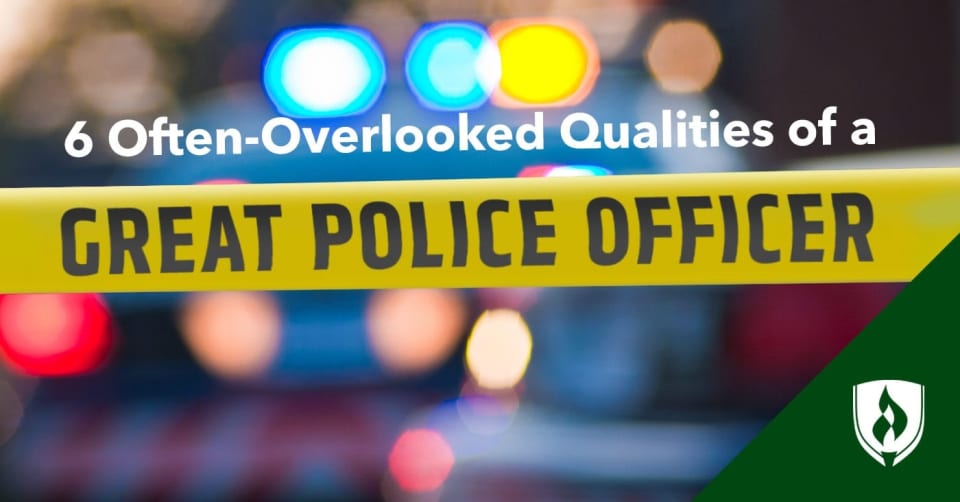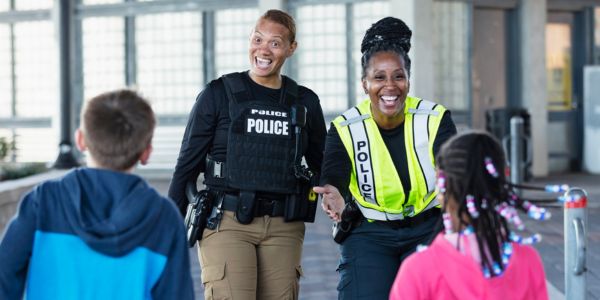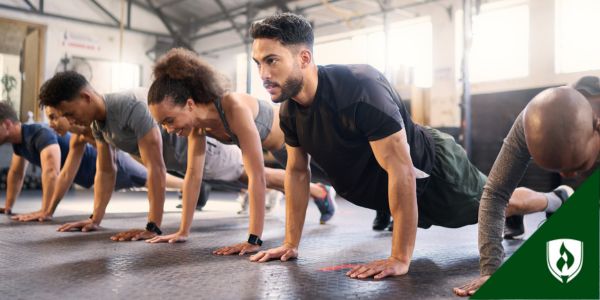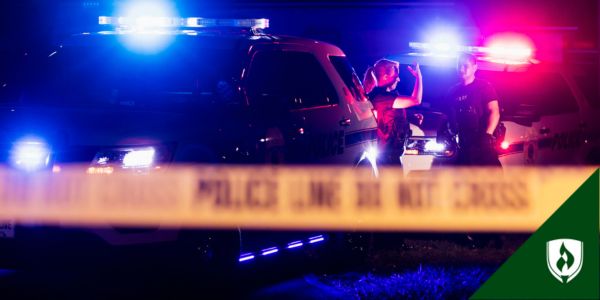
If you’ve long dreamt of helping others by serving your community and keeping dangerous criminals off of the street, it’s no wonder you’ve considered becoming a police officer. But you’ll want to be sure you’ve got what it takes to succeed before diving into such an important career.
When asked about the characteristics of a police officer, most people will rattle off adjectives like strong, brave and heroic. While such qualities are definitely in the job description, there are several less-prominent traits that the best police officers share.
We spoke with seasoned law enforcement professionals to learn more about the overlooked abilities that distinguish an average officer from a great one. Take a look at what they had to say—you may even be surprised to learn you already possess some of the most important qualities of a police officer.
What makes a good police officer? 6 Surprising qualities
It’s true that law enforcement professionals tend to be courageous and physically fit. But there’s a lot more to it than that. Learn more about some of the important qualities that make a good police officer.
1. Communication skills
Are you the type who is extremely thorough when writing emails or letters? When you relay a story, do you take special care to ensure you don’t leave out any important details, painting as vivid and accurate a picture of what happened as possible? If so, you’ll be happy to hear that these valuable communication skills can be leveraged in a successful law enforcement career.
In fact, proficient communication skills can be more than just helpful as a police officer—they can be vital. “When you write a report, your specific wording can be the difference between something usable in court and something that gets thrown out,” explains Brian McKenna, a retired Lieutenant with more than 30 years of law enforcement experience under his belt. “You have to be very exact, and you have to know the laws that impact your reports.”
It’s also true that your ability to communicate clearly can help you earn the trust of the community in which you serve as a law enforcement officer. “Interpersonal communication skills are important because they allow officers to develop a good rapport with the community, with fellow officers and with those from diverse cultures,” offers Eileen Carlin, state program director for the Rasmussen University School of Justice Studies.
Another important aspect of effective communication is the ability to patiently listen. “Officers who take the time to really hear what people are saying and who ask questions with real curiosity are going to get better results,” McKenna says. He explains that when citizens feel like police officers truly care, they’re more likely to cooperate, they typically offer more information and they often work to help law enforcement get to the bottom of an issue.
2. Compassion & empathy
When it comes to pursuing the tough work of being a police officer, you may have considered your compassionate personality to be a drawback. But the ability you’ve gained to show empathy and when to provide tough love to your children, siblings or friends may actually come in handy on the job.
"We desperately need good police officers. Now more than ever, we need people who care about the job and will build rapport with the public."
Much of an officer’s work requires the ability to relate to those going through incredible hardships, showing compassion while still remaining professional. “You will find yourself inserted into the most tragic and chaotic moments of people’s lives,” points out Charles Redlinger, former police officer and cofounder of MissionX. “Their world will be upside down, and you will need to be a compassionate, strong authority figure. You will be the symbol of both calm and sympathy.”
Not only will a steady source of empathy help you be an effective police officer, but it can also become the driving force behind your work. Redlinger references his years as a homicide detective, recalling how the compassion he felt for the victims’ loved ones helped motivate him to solve the crime.
“This is a tough balance,” McKenna notes. “You have to hang onto your compassion without letting things get to you.”
He thinks back to when he first started working in law enforcement and was called to the scene of a suicide. “I made myself see the body,” McKenna says. “It disturbs you, and it can really get to you over time. But I thought, ‘Someday I’ll see a scene like this and the person might still be alive. I might have to try to save them. I can’t lose my composure.’”
But it’s also true that throughout his years serving his community, McKenna has seen officers with ¬≠too much empathy struggle against the harsh realities they encounter on the job. “Your instinct is to detach,” he explains. “You start thinking of your loved ones in those scenes, and it’s tougher than people understand. But if you can keep your compassion without carrying everything home with you, that’s a really valuable quality.”
3. Integrity
If you’re the type to always follow through in performing top-quality work, whether or not a superior is present, then you already possess one of the top characteristics of a police officer. “Integrity is a fundamental trait required for police work and quite possibly the most important,” Redlinger maintains. He believes this is a key factor in the public trusting and having confidence in their law enforcement officers.
The best police officers, McKenna offers, are the ones who go above and beyond—the ones who hustle without necessarily getting rewarded. “You can sit back and try to minimize risk as much as possible, and still earn a paycheck,” he says. But he emphasizes that while engaging in the community and actively investigating can open you to more risk, it also results in increased trust from citizens as you gain more results against crime.
When you consider why community members allow officers into their home as strangers, why they feel safe stopping their cars for an officer on a dark side road, or why officers are often given the benefit of the doubt when testifying in court, Redlinger says it all comes down to one quality: integrity.
4. Negotiation skills
Have you ever found yourself in a situation where you’ve had to talk a friend or family member through a tough time by helping them find solutions to their problems instead of simply reacting? Perhaps you have an ability to talk your way through a problem while convincing others to act appropriately.
These skills would fall under the umbrella of negotiation—one of the vital traits of a police officer. The crisis incidents officers may encounter on the job include several factors, such as negative emotions dictating people’s actions, people failing to listen, tension increasing and failing to see alternative options.
Effective negotiation skills often include practices like active listening, remaining calm, expressing empathy, treating a subject with respect, remaining non-judgmental and referring to a subject by name when possible. Ineffective negotiation behaviors include things like being confrontational, making promises you can’t keep, telling a subject to calm down, being demanding, rushing the process and being judgmental.
Redlinger explains that negotiation skills not only protect the general public, but they protect the officers involved as well. “Officers working patrol duties are constantly responding to 911 calls for service. It is in these vital moments upon the first officer arriving that negotiation skills will prove useful.”
5. Eagerness to learn
Someone who is naturally curious and is continually willing to grow their knowledge and abilities has the potential to make a sizeable impact as a police officer. Even though law enforcement officials endure a substantial amount of training before they find themselves in uniform, there’s always more they’ll have to learn on the job.
“One of the things people don’t realize about police work is that you have to be a jack-of-all-trades,” McKenna explains. “Expectations for officers are really high, and new things are always getting added to their plates.”
Back when he began his career as an officer, for example, squad cars were outfitted with simple radios—a way for officers to call something in and have dispatch take care of it. Police cars today, McKenna notes, are equipped with computers, calling upon the officers to not only master new technology but also to absorb the duties that previously fell to people in other positions. It’s also true that the equipment officers now carry is twice as extensive as it was in prior years.
“Additionally, there are more drugs on the market than ever, and laws change and update,” McKenna says, adding that departments don’t always have the funding to ensure everyone receives the training they need in these areas. That’s why he took it upon himself to take various classes throughout his law enforcement career, committing to learn the different skill sets and laws he’d need. “Lots of police officers attend conferences and classes on the side of their jobs.”
6. Mental agility
Even if you weren’t the student who scored the best grades in every class, you may be the type who’s always had plenty of common sense. If you know how to read a room and adjust your conversation or attitude as needed, you could thrive in policing. While some people have difficulty adjusting when their plans are disrupted, the best police officers take on their surroundings without missing a beat.
McKenna sees this as a potentially life-saving skill. “You go into so many scenarios expecting one thing, when something completely different happens. You might only have seconds to react,” he explains. Officers who have strong mental agility are able to switch their mindset instantly without losing composure.
“There is a very subtle difference you can observe between someone reaching for a gun and someone reaching for a wallet. It’s hard to spot, but if you know what to look for, you’ll be able to read warning signs,” McKenna adds. “You have to remain calm when things don’t go as planned. Twice, I pulled a gun on another police officer in the confusion of a situation, but I had the presence of mind to not pull the trigger.”
Mental flexibility can be a life-altering skill, both for officers and for those they encounter. But it’s also a vital trait when pursuing an investigation. McKenna references an old saying they often repeated in his time on the force: “The one who did it is never the one you expect.”
“Officers who go into a situation with preconceived ideas—who don’t carefully observe and adjust their expectations—are going to get it wrong,” he says.
Do you possess these police officer qualities?
If you’ve set your sights on becoming a police officer, it’s important for you to evaluate your specific traits and challenges to ensure you’ll be cut out for a career in law enforcement. “We desperately need good police officers,” McKenna says. “Now more than ever, we need people who care about the job and will build rapport with the public.”
If you have some of these lesser-known qualities of a police officer, you might be a natural fit for a career in law enforcement. With the proper training, you can leverage these talents to help make a meaningful impact in your community. Learn more about the process in our article, "How to Become a Police Officer: Your Step-by-Step Guide."
Interested in different types of careers in law enforcement? Check out our article about conservation officers.
Rasmussen University's Criminal Justice program has not been approved by any state professional licensing body and does not lead to any state-issued professional license. In Minnesota, the Criminal Justice Associate’s degree program does not meet the standards established by the Minnesota Peace Officer Standards and Training Board for persons who seek employment as a peace officer.
Related Articles:
- Behind the Badge: Examining 10 Types of Police Officers
- 7 Lesser-Known Types of Crimes You Might Encounter as a Police Officer
- 30 Legal Terms Every Future Criminal Justice Professional Should Know
- Are There Legal Ramifications to Publishing Fake News Stories?
- 22 Criminal Justice Blogs to Follow in 2018 & Beyond
- Police Stress: 9 Tips for Avoiding Officer Burnout
- Behind the Badge: Student Stories of Passion for Police Work
- Police Officers Explain Why Diversity in Law Enforcement Matters
EDITOR’S NOTE: This article was originally published in 2015. It has since been updated to include information relevant to 2019.




